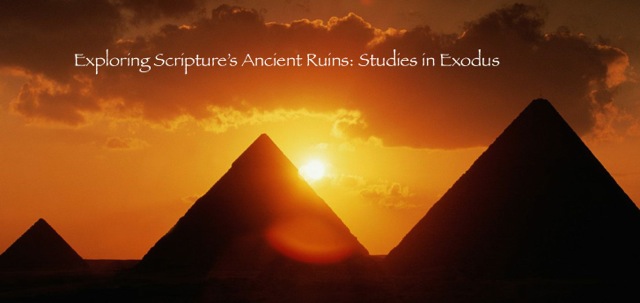
©1998-2015
Fellowship
Life of Moses
Lesson 19
About Midnight…
Ex 11:1-10
Orig. 4.16.3; Updated: 1.25.15
Looking Back So Far…
Moses Makes 12 Appearances Before Pharaoh.
From Exodus 3-14, at the divine command of Yahweh (I AM), the children of Israel’s God, Moses, not once or twice or even three times, but an exhausting 12 times, will stand before Egypt’s mighty ruler, the pharaoh, whom the Egyptians consider to be divine as well, warning him to release the enslaved children of Israel, including their women, children and livestock, in order that they might travel three days into the desert so that they may hold a pilgrim festival to the God of their forefathers, Yahweh God.
39 Occurrences of “Release” or “Deliverance” are Mentioned.
In addition, in these 12 critical chapters, the writer of Exodus, presumably Moses, will make mention of Egypt’s “release” of Israel a whopping 24 times. Add this to another 15 mentions of Israel being “delivered out of Egypt,” and the reader is told 39 times why Israel’s God, Yahweh, is using these series of divine plagues or curses, to cause the mighty Egypt to “release” its grip of God’s now-enslaved people, Israel.
10 Consecutive, Pervasive and Devastating Curses are Unleashed upon Egypt.
At the same time, in one of the great plot twists of all-time, Yahweh God seems to have little interest in a direct approach that would cause Egypt to release its crushing grip on her enslaved serfs. Instead, using something akin to a modern-day top ten count down, Yahweh, while sparing his enslaved child, Israel, any pain, will inflict ten consecutively, pervasively and devastating curses upon Egypt, with the last being a curse that crushes the once-mighty collective psyche of the nation that had once constructed the great Pyramids.
10x the text clearly says that Yahweh distinguishes between Israel and Egypt with respect to the plagues’ devastating affects.
Neither Pharaoh’s Diviners nor gods are any Match for Yahweh’s Mighty Hand.
And for a brief moment, as society often seems to be able to do, but only for a brief moment, Egypt will appear to keep up with Yahweh’s divine power. Pharaoh’s wise men, astrologers and magicians, along with their pre-curse turning of their own staffs turning into snakes, as Moses’ staff had become (although Moses’ staff/snake was able to devour the magician’s many staffs/snakes), will somehow manage to replicate the appearance of the first two curses. But after that, as far as the magicians’ abilities are concerned, they are done for, and by the 6th plague, when they are woefully inflicted by the plague’s festering boils, they refuse to even make an appearance before Pharaoh due to their hideous condition.
In Delivering Israel from Egypt. Yahweh God Defeats as Many as 118 Egyptian gods and goddesses.
It is also interesting to note that Yahweh’s last and greatest curse against Egypt, the curse of Egypt’s firstborn, is not just directed against the firstborn of man and beast, but also “against all the gods of Egypt” (Ex. 12:12).
In Moses’ Song of Deliverance after the salvific crossing of the Red Sea, he will ask, “Who is like you among the gods, O Yahweh?” (Ex. 15:11). Later, when Moses is met by his father-in-law, Jethro, in the wilderness, where Moses first received his commission by Yahweh to administer Israel’s deliverance from Egypt, Jethro will bless Moses with these words: “Now I know that Yahweh is greater than all the gods” (Ex. 18:11). And beginning with Ex. 20:2ff when Yahweh and Israel ratify their covenant together as God and nation, Yahweh makes it perfectly clear to Israel 9 more times just in the book of Exodus, your worship of me is exclusionary: I am Yahweh your God, who brought you out of slavery in Egypt. Unlike, Egypt, you shall have no other gods before me; nor shall you make any idols for yourselves, and you shall certainly not worship them for I am a jealous God, and you have just seen how easily I was able to humble and humiliate the greatest nation. Believe you me, I will not spare your discipline for at least four generations.”
It is interesting to note that in defeating Egypt, Yahweh, not only defeated her seemingly-divine pharaoh and his diviners, but in doing so, he also invalidated the power and strength of her many gods and goddesses, which Wikipedia numbers as many as 118, including Ra, the sun god; Isis, the mother god, also linked with motherhood, protection and magic; Amun, the creator god and preeminent deity during the New Kingdom (c. 1550 BC – c. 1077 BC), Astarte or Ishtar, the warrior goddess; Baal, the sky and storm god (also worshiped during the New Kingdom); Hapi, the personification of the Nile’s annual flooding; Heka, the personification of magic; Heket, the frog goddess said to protect women in childbirth and Hesat and Mehet-Weret, maternal cow goddesses, just to name of few.
http://en.wikipedia.org/wiki/List_of_Egyptian_deities
Under Intense National Pain and Pressure, Pharaoh Expresses a Momentary Remorse and Contrition on 3 Occasions.
Pharaoh is momentarily contrite (3x) while admitting sin (2x) and asking Moses to prayerfully intercede on behalf of Pharaoh’s disobedience to Y. for not releasing the Israelite as commanded by Y. in order that they may fully serve Y. God in the desert with sacrifices (4x), once even asking for forgiveness.
7x Pharaoh, you can go and sacrifice (2, 4, 7, 8, 9 [2x]; 10); 4x, because of the hardening of his heart, he will change his mind and recant his promise; 4x Pharaoh unsuccessfully attempts to bargain with God or Moses.
At the Same Time, there are 17 References to the “Hardening” of Pharaoh’s Heart.
Yahweh goes about his indirect and dynamic plot build up via the on again off again “hardening” of Pharaoh and his ministers’ hearts—in other words, although Egypt will be humbled by each plague, after the plague or curse ceases, once again, her heart will be “hardened” towards the “releasing” of Israel in order to celebrate a pilgrim feast to her God, Yahweh.
Moses makes mention of this “hardening” a total of 17 times, with 9 references being attributed directly to Yahweh’s divine intervention, 6 neutral occurrences, which could be inferred to as being attributed to Yahweh and 3 more occurrences in which Pharaoh and his servants are given the credit of “hardening” their hearts.”
7 Times Yahweh Predicts that Pharaoh Will Not Listen.
On 7 more occasions, the Scripture will say that Pharaoh “refused to listen” as God also predicted 7 times.
What’s the Point to all this Protracted Drama? Undisputed Truth…about both a Mighty Creator and his Fickle Creature.
What’s the point to all of this back and forth “repenting” for not releasing Israel and then changing her mind again not to “release” Israel? Perhaps there are several reasons, two of which are: 1) whether influenced by God or not, the obvious fickleness and stubbornness of man’s fallen, sinful will. To one degree or another, don’t we all go back and forth in our thinking, feeling and behaving? We believe pain as taught us, but once the pain has subsided, seemingly, we must make sure that the pain we suffered was a really a consequence of our behavior, and so, we have to repeatedly learn our painful lesson, until we are finally crushed and left with no other conclusions and no other means of escape or rationalization. As fallen, deceitful creatures, we can be very obstinate in our willingness to truly learn who is really in charge and who is really our salvation. So it was with Pharaoh, who, probably blinded by centuries of handed wealth and power, never seemed to get who really was in charge.
2) And secondly, Yahweh tells Moses, before and during the unleashing of the plagues, that “I will harden Pharaoh’s heart that I may multiply my signs and wonders in the land of Egypt, and when Pharaoh refuses to listen, I will lay my hand on Egypt and bring out…my people the sons of Israel” (7:2-3; 11:9-10). “The Egyptians shall know that I am I AM (Yahweh) and that there is no one like me in all the earth. For if by now I had put forth my hand…, you would have been cut off from the earth, but for this reason I have allowed you to remain—to show you my power and in order to proclaim my name through all the earth” (9:14-15). In other words, the greater Egypt’s resistance, the greater her defeat and the greater her overcomer, Yahweh God. Finally, when Pharaoh’s pursuing cavalry is about to be utterly annihilated, Yahweh declares, “I will be honored through Pharaoh and all his army, and the Egyptians will know that I am I AM..that God, not many gods, exists (14:3, 17).
So with this one protracted drama, God reveals not only the smallness and immaturity of fickle, human man, including one of the world’s great powers and its seemingly divine leader, but God’s true greatness, wisdom, power and his desire to deliver those who truly trust in him.
Thanks,
Your servant,
Joe
Continue reading →






